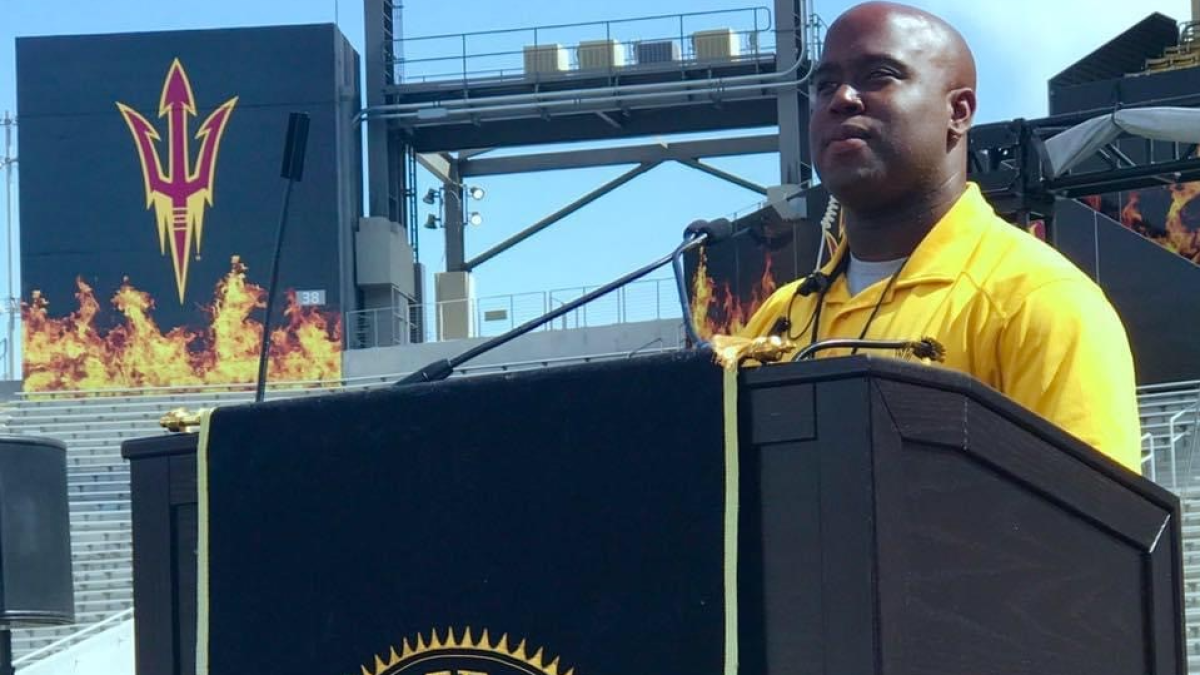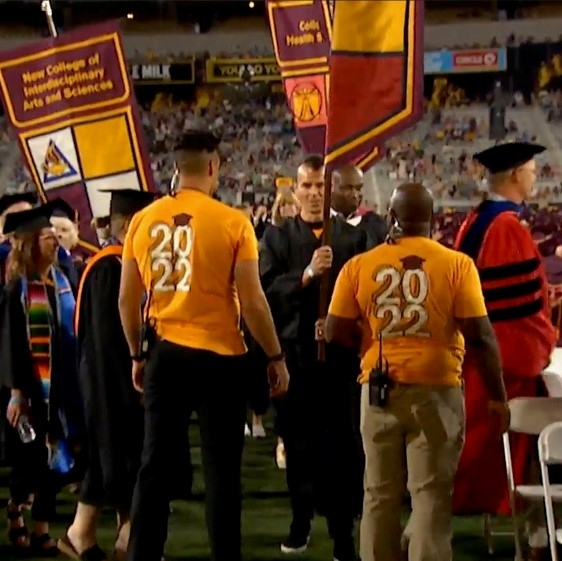Watts College chief of staff named to national board of university commencement officers

Marcus Jones looks over the field at Sun Devil Stadium before ASU's spring 2022 commencement. Photo courtesy of Marcus Jones
February 2024 update: Marcus Jones, chief of staff to the dean of Watts College of Public Service and Community Solutions, was elected to serve as president of the North American Association of Commencement Officers (NAACO) at its annual conference in Fort Worth, Texas. He will begin his term as president-elect in August 2024 and serve as president in August 2025. He currently serves on the Board of Directors as director at large for education, overseeing the organization’s education portfolio including a certificate in academic ceremonies, monthly educational webinars and the curation of education offerings at the annual conference.
Ceremonies and rituals are more than inspiring speeches, bright decorations and rousing music. They stir special emotions that come from milestones celebrated meaningfully and well. College and university graduations are, of course, no exception.
Marcus Jones aimed for a milestone of his own when he volunteered to work at an Arizona State University commencement in 2012: He had hoped to meet Tom Brokaw, who was a keynote speaker at that spring’s ceremony. Although he wasn't able to meet the famed former NBC News anchor, Jones — today the chief of staff at ASU’s Watts College of Public Service and Community Solutions — said the experience was so enjoyable, he wanted to do it again.
This month, Jones joined the leadership of a national organization dedicated to top-quality graduation ceremonies. He began a three-year term Aug. 1 as a director-at-large for education of the North American Association of Commencement Officers (NAACO), an organization that started at ASU in 2000.
Jones will solicit and select educational presentations for the NAACO annual conference, administer a certificate program that trains rising academic-ceremonies planners and oversee a monthly “hot topics” program that provides ongoing education on subjects that are timely and relevant to the organization’s members.
Melissa Werner, ASU executive director of university ceremonies at the Office of University Events and Protocol, co-founded NAACO with Carol Switzer, who was ASU’s director of summer sessions and study abroad from 1993 to 2008. Switzer passed away in 2011.
Read more of NAACO’s history here.
“Twenty-two years later, the association is going strong,” said Werner, who is no longer in the NAACO leadership but remains an active member. “I’m so thrilled that Marcus has joined the NAACO board. Marcus is one of individuals who gives his all and never seems to tire. In addition to doing his current, demanding job as chief of staff, he still volunteers for commencement and other special-interest events during the week of graduation ceremonies.”
Werner and Jones teach PRM 422, Special Event Tech and Production, as part of the Watts College special event certificate program in the School of Community Resources and Development.
“I really enjoy working with Marcus and teaching with him in the spring,” Werner said. “He brings such a wealth of experience to his work, his volunteer role and his teaching assignments.”
In fall semester 2022, Jones will be teaching TDM 345, Meeting and Convention Planning, and TDM 386, Convention Sales and Management, by himself.
Jones’ appointment reflects his multitude of talents, said Watts College Dean Cynthia Lietz.
“Marcus Jones is known for his initiative, ability to build connections and experience in managing large-scale events and ceremonies,” Lietz said. “His board appointment on NAACO provides further evidence of this unique expertise. We are so fortunate to have him serving as chief of staff!”
Jones earned his Master of Education in higher postsecondary education from ASU. His Bachelor of Arts in public service and public policy, leadership and management is from the Watts College-based School of Public Affairs.
Read on to learn more about Jones, what goes into a successful university ceremony and his new role on the NAACO board.
Editor's note: Responses have been edited for length and clarity.
Question: What first led you to be interested in being part of the process of organizing and presenting convocations and commencements?
Answer: I have always loved planning events. In fact, I even helped plan my own high school graduation. I took an interest in volunteering at university commencement because I wanted to see (former NBC News anchor) Tom Brokaw when he was the speaker at the spring 2012 ASU commencement ceremony. So I signed up to volunteer to carry the flags onto the field, with the hopes that I would get a chance to meet him.
I did not get to meet him. But I saw all the wonderful staff working behind the scenes to put on this amazing event, and I knew that I wanted to be a part of it.
When I started working at the Mary Lou Fulton Teachers College in 2014, one of the first things I asked my boss was if I could work at our graduation ceremony, and he said yes. I worked with the event coordinator at that time and helped her execute the ceremony, and that is where I met Melissa Werner and Melissa Chavez in University Ceremonies. They saw me politely yelling at (directing) our faculty to get the ceremony started. Then they asked me to volunteer at their ceremony in the fall to help with the faculty processional. And so here we are, eight years later!
Q: University ceremonies take plenty of planning, a creative eye to produce one of the participants’ most important life experiences, and then proper execution to make it meaningful and memorable. Please talk a bit about the process that goes into convocations and commencements.
Wearing special gold shirts identifying them as working at the spring 2022 ASU undergraduate commencement ceremony is Marcus Jones (right) and the Watts College's events coordinator, Enrique Zaldivar. Photo courtesy of Marcus Jones
A: I like to think of graduation as this puzzle for which you know all the pieces exist, but you have to find them all before putting the puzzle together. Then, as you’re building the puzzle, one of the pieces shape-shifts, and then you have to make it work. It’s a lot of figuring out who needs to be where and when, making sure that they know how to get there and having backup plans for when they don’t.
You have five major groups that are involved in the planning of graduation:
- The students who are graduating.
- Their family and friends.
- Our phenomenal faculty that want to see their students walk.
- Our outstanding staff who want to help them celebrate as well.
- The folks that you don’t see behind the scenes.
My job is to manage those five groups and think about their journey on the four to five months leading up to the ceremony and what happens after it. I have to remember that our students want their names called and their families, friends and other guests want to be there to help them celebrate. How I can design a meaningful experience the three hours that they are with us on campus?
And it is not just me doing this. This takes the work of dozens of other staff (group 5) whom you can’t see, who help us put together a great experience and show for our guests. All of our collective work comes together when the names start being called and you hear the families cheering and the air horns going off. Then I know that I did my job well. My favorite commencement moment is when the streamer cannons and fireworks go off. Similarly for convocation, it’s when the balloons drop from the ceiling of Desert Financial Arena, and you see everyone look up in awe. It’s a feeling that never gets old.
Q: How will you be involved in your new role as NAACO director-at-large?
A: In my new role as director-at-large, I am excited to lead our association’s educational offerings to help continue training the next generation of people who work in graduation. When I go to our conference every year, I get to meet so many people who are new to the profession and they’re just looking for guidance. We have all types of folks who are entry-level and also experienced event planners, folks who are actually staff members in the registrar’s office, or the assistant of an executive of the university, and this fell onto their plates. Our association has so many experienced planners whom I have learned from and continue to learn from. I am excited to help facilitate that exchange of knowledge.
We just got through a tough couple of years of planning ceremonies during COVID-19, and now we’re all adjusting to a new a normal, but I am excited for the future.
Q: From your experiences, what should one always do when putting on a ceremony? What should one always not do?
A: Under “to do,” we as planners are used to doing our ceremonies over and over, and after a while it becomes a routine to us. But I think it is important to always remember that our ceremony may be our students' and their families’ first graduation experience. Therefore, we need to make sure we treat them as such, so that they have a wonderful experience and that it is a memorable one. I am a first-generation college graduate, so I deeply understand what it feels like to graduate and not know what to expect and having family travel to a new place.
Under “not to do,” graduation is rooted in deep tradition as well as pomp and circumstance (that is, impressive formal activities or ceremonies; not the song) that are very important to recognize and display. It is my job to understand the history of our ceremony, why we do certain things, the various protocols in place, whether formal or informal, all while making sure the ceremony maintains decorum. However, we have to recognize that as an institution, we are made up of thousands of individuals from many different backgrounds, beliefs and abilities. I cannot let “we have always done it this way” get in the way of providing a welcoming experience for all. I can’t be perfect, but I can make sure our ceremony is welcoming for all and be accommodating, to the best of my ability.
More Sun Devil community

ASU wide receiver Xavier Guillory driven by faith, family and heritage
It’s a few minutes into the Zoom call when Arizona State senior wide receiver Xavier Guillory is asked about his father.He looks…

Our photographers share their favorite photos of 2024
Photos can tell a story in ways that words sometimes can't, capturing the action, beauty and emotion of the moment. And as we…

How Kenny Dillingham remade ASU's football team in just 1 year
When Arizona State University football coach Kenny Dillingham went about rebuilding his roster after a 3-9 season in 2023, the…
